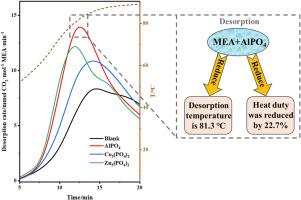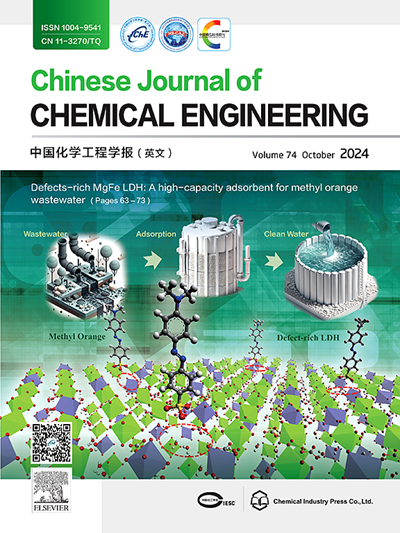在单乙醇胺溶液中使用金属磷酸盐催化剂高效、环保地捕获二氧化碳
IF 3.7
3区 工程技术
Q2 ENGINEERING, CHEMICAL
引用次数: 0
摘要
催化二氧化碳(CO2)解吸已成为一种很有前景的方法,可提高二氧化碳捕获效率,同时最大限度地减少能源需求,这对推进化学吸收方法至关重要。本研究调查了三种金属磷酸盐(磷酸铝(AlPO4)、磷酸钴(Co3(PO4)2)和磷酸锌(Zn3(PO4)2))在改善基于 MEA(单乙醇胺)的二氧化碳吸收解吸性能方面的催化潜力。在测试的催化剂中,AlPO4 表现出更优越的性能,在五个循环中,二氧化碳吸收能力提高了 4.2% 至 9.3%,解吸能力提高了 12.3% 至 22.7%。值得注意的是,与不使用催化剂的工艺相比,在解吸温度为 81.3 °C 时,AlPO4 将二氧化碳解吸率提高了 104.4% 以上,同时将所需显热降低了 12.3% 至 22.7%。效率的提高归功于 AlPO4 能够有效地将氢质子从质子化的 MEA 转移到氨基甲酸酯上,从而促进氨基甲酸酯的分解和二氧化碳的再生。这项研究为二氧化碳解吸引入了一种可行、经济、环保的固体酸催化剂策略,有助于开发能效更高的二氧化碳捕获技术。本文章由计算机程序翻译,如有差异,请以英文原文为准。

Efficient and eco-friendly carbon dioxide capture with metal phosphate catalysts in monoethanolamine solutions
Catalytic carbon dioxide (CO2) desorption has emerged as a promising approach to enhance the efficiency of CO2 capture while minimizing energy demands, crucial for advancing chemical absorption methods. This study investigates the catalytic potential of three metal phosphates (aluminium phosphate (AlPO4), cobaltous phosphate (Co3(PO4)2), and zinc phosphate (Zn3(PO4)2)) in improving the MEA (monoethanolamine) -based CO2 absorption-desorption performance. Among the catalysts tested, AlPO4 demonstrated superior performance, enhancing CO2 absorption capacity by 4.2% to 9.3% and desorption capacity by 12.3% to 22.7% across five cycles. Notably, AlPO4 increased the CO2 desorption rate by over 104.4% at a desorption temperature of 81.3 °C, simultaneously reducing the required sensible heat by 12.3% to 22.7%, compared to processes without catalysts. The improved efficiency is attributed to AlPO4's ability to effectively transfer hydrogen protons from protonated MEA to carbamate, thereby facilitating the decomposition of carbamate and regenerating CO2. This research introduces a viable, cost-effective, and eco-friendly solid acid catalyst strategy for CO2 desorption, contributing to the development of more energy-efficient CO2 capture technologies.
求助全文
通过发布文献求助,成功后即可免费获取论文全文。
去求助
来源期刊

Chinese Journal of Chemical Engineering
工程技术-工程:化工
CiteScore
6.60
自引率
5.30%
发文量
4309
审稿时长
31 days
期刊介绍:
The Chinese Journal of Chemical Engineering (Monthly, started in 1982) is the official journal of the Chemical Industry and Engineering Society of China and published by the Chemical Industry Press Co. Ltd. The aim of the journal is to develop the international exchange of scientific and technical information in the field of chemical engineering. It publishes original research papers that cover the major advancements and achievements in chemical engineering in China as well as some articles from overseas contributors.
The topics of journal include chemical engineering, chemical technology, biochemical engineering, energy and environmental engineering and other relevant fields. Papers are published on the basis of their relevance to theoretical research, practical application or potential uses in the industry as Research Papers, Communications, Reviews and Perspectives. Prominent domestic and overseas chemical experts and scholars have been invited to form an International Advisory Board and the Editorial Committee. It enjoys recognition among Chinese academia and industry as a reliable source of information of what is going on in chemical engineering research, both domestic and abroad.
 求助内容:
求助内容: 应助结果提醒方式:
应助结果提醒方式:


